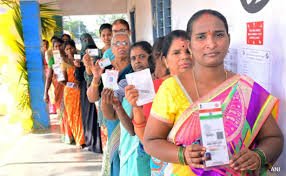On Friday, India commenced its mammoth general election, marked by intense campaigning and allegations of democratic erosion under Prime Minister Narendra Modi’s leadership over the past decade. With more than 969 million eligible voters, this election is a crucial moment in Indian democracy.
The voting, spanning over six weeks until June 1st, started with the first phase across 102 constituencies. Despite claims of predictability, Modi’s Bharatiya Janata Party (BJP) faces accusations of manipulating the electoral playing field to its advantage. Critics argue that the government has compromised institutions like the election commission and the judiciary, besides suppressing dissenting voices in the media.
Opposition leader Rahul Gandhi labeled the election as “rigged,” framing it as a battle for India’s democratic principles. The BJP’s campaign, centered on Modi’s leadership and Hindu nationalist rhetoric, has appealed to many, promising economic growth, infrastructure development, and a revival of India’s ancient cultural heritage.
However, concerns persist over the BJP’s treatment of minorities, particularly Muslims, who have faced discrimination and violence. Despite such controversies, Modi’s popularity remains high among supporters like Bharat Sarkhejiye, who sees him as a dynamic leader transforming India’s global image.
Yet, not all share Sarkhejiye’s optimism. Ajay Lakhotra, a young voter, criticizes the BJP’s communal politics and calls for a more inclusive vision of development. Similarly, Chopdar, a Muslim entrepreneur, fears the consequences of another BJP term, advocating for a strong opposition to counter divisive politics.
1st election phase
Meanwhile, the voting turnout on the first day reached 60.03%, with some states recording significant participation. However, incidents of violence and irregularities were reported in several regions, raising concerns about the election’s fairness.
As the BJP aims for a landslide victory, the opposition struggles to present a united front against Modi’s dominance. Despite attempts to form alliances, internal divisions and government actions have hindered opposition cohesion.
As the electoral saga unfolds, India stands at a crossroads, grappling with issues of democracy, identity politics, and economic development. The outcome of this election will not only shape India’s political landscape but also its societal fabric for years to come.
The counting of votes is scheduled for June 4th, promising to reveal the verdict of the world’s largest democracy.
With the fate of over a billion people hanging in the balance, India’s election remains a testament to the enduring struggle for democracy and social justice in the 21st century.












